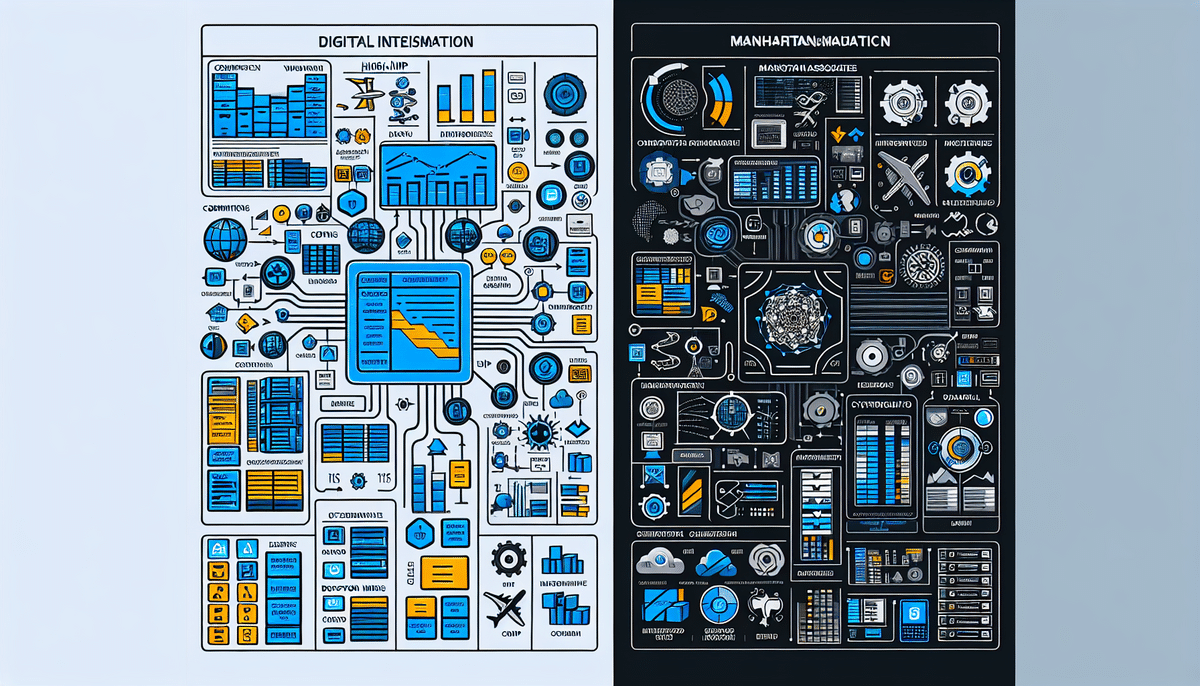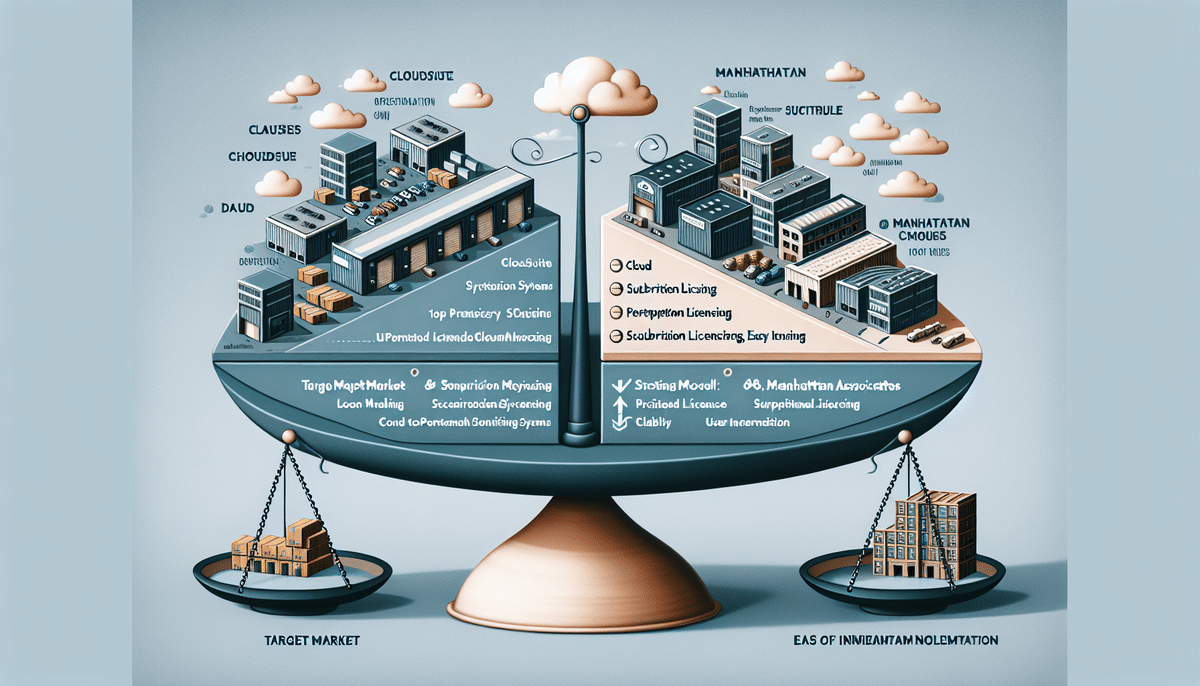As the world of e-commerce continues to grow, the demand for efficient and effective warehouse management systems (WMS) for textile and apparel wholesale businesses is on the rise. A WMS can help streamline operations, increase productivity, reduce errors, and ultimately boost profitability. With so many options available in the market, choosing the right WMS can be overwhelming. In this article, we will explore the top 10 WMS for textile and apparel wholesale e-commerce businesses and what you need to consider when making your choice.
What is Warehouse Management System (WMS) and Why is it Important for Textile and Apparel Wholesale E-Commerce Businesses?
A warehouse management system is a software solution designed to help businesses manage and optimize their warehouse operations. It can automate and track inventory levels, manage order fulfillment, and monitor the movement of goods throughout the warehouse. For textile and apparel wholesale e-commerce businesses, a WMS can be particularly important in helping to manage the complexity of seasonality, fluctuations in demand, and ever-increasing customer demands for faster and more accurate fulfillment.
Additionally, a WMS can also provide real-time visibility into inventory levels and order status, allowing businesses to make informed decisions about restocking and order prioritization. This can help to reduce the risk of stockouts and overstocking, which can lead to lost sales and increased costs. Furthermore, a WMS can improve overall warehouse efficiency by reducing manual processes and errors, freeing up staff time for more value-added tasks. Overall, implementing a WMS can be a crucial step for textile and apparel wholesale e-commerce businesses looking to stay competitive in a rapidly evolving industry.
Benefits of Implementing a WMS in Textile and Apparel Wholesale E-Commerce Businesses
The benefits of implementing a WMS are numerous and tangible. One of the key benefits is the ability to increase efficiency and productivity within your warehouse operations. A WMS can enable you to process customer orders more quickly by reducing order processing times. It can help you optimize stock levels and improve inventory accuracy, which can help reduce stock shortages and overstocks. Additionally, a WMS can help reduce labor costs through automation and improved tracking technologies.
Factors to Consider When Choosing a WMS for Textile and Apparel Wholesale E-Commerce Businesses
Choosing the right WMS can be challenging, given the many options available. Some key factors to consider when selecting a WMS for your textile and apparel wholesale e-commerce business include:
- Integration with your existing systems
- Scalability to accommodate anticipated business growth
- Flexibility to adapt to changing business requirements
- Functionality required for your specific business needs
- Pricing considerations for implementation, maintenance, and support
- Cybersecurity and data privacy considerations
Top 10 Warehouse Management Systems for Textile and Apparel Wholesale E-Commerce Businesses: An Overview
There are many great options for WMS in the market, but we have selected the top 10 for textile and apparel wholesale e-commerce businesses based on their features, customer feedback, and pricing. These systems are:
- NetSuite WMS
- SAP Extended Warehouse Management
- Omnna
- Cin7
- Datex FootPrint WMS
- Infor Warehouse Management
- CargoWise One
- Magento Commerce Order Management
- iM3 SCM Warehouse Management
- Zoho Inventory
Detailed Review of the Top 5 Warehouse Management Systems for Textile and Apparel Wholesale E-Commerce Businesses
Let's dive deeper into the top 5 WMS on our list and what makes them stand out:
1. NetSuite WMS
NetSuite WMS is an integrated WMS solution designed for mid-sized and enterprise-level businesses. It provides end-to-end functionality for managing complex warehouse operations, including inventory and order management, customer satisfaction, and cost reduction. NetSuite's WMS can also be integrated with its other modules, such as ERP, CRM, and e-commerce, for a comprehensive solution that can improve operational efficiency and visibility across your business.
2. SAP Extended Warehouse Management
SAP Extended Warehouse Management (SAP EWM) is a solution designed for large and complex warehouse operations. It offers advanced inventory management, control, and optimization capabilities to help drive the efficiency of warehouse and distribution operations. SAP EWM can be integrated with other SAP modules and can also be interfaced with third-party logistics providers, making it a flexible and easily long-term scalable solution for textile and apparel wholesale businesses.
3. Omnna
Omnna is an all-in-one cloud-based ERP platform that includes a feature-rich WMS module. Omnna's WMS has a user-friendly interface that allows for easy implementation and minimal setup time. It includes robust features such as inventory control, picking and packing, order management, and more. With the Omnna WMS, you can manage multiple locations, increasing inventory visibility across the supply chain.
4. Cin7
Cin7 is a feature-rich solution that specializes in inventory management. Cin7's WMS integrates with e-commerce platforms, payment gateways, and marketplaces, allowing for streamlined multi-channel management. Cin7 provides all the features required for running efficient warehouse operations, including inventory control, pick and pack, and order management. Cin7 also comes with comprehensive reporting that allows you to track inventory levels and sales in real-time.
5. Datex FootPrint WMS
Datex FootPrint WMS is a cloud-based solution that enables businesses to manage multiple warehouses in different locations. Datex FootPrint WMS includes a range of features, including inventory control, order processing, shipping management, and billing management. Datex FootPrint WMS offers a scalable solution that can adapt to your growing business and can be integrated with a range of e-commerce platforms.
Comparison of Features, Pricing, and Customer Support of the Top 10 Warehouse Management Systems for Textile and Apparel Wholesale E-Commerce Businesses
Here is a quick comparison of the top 10 WMS in terms of key features, pricing, and customer support:
| Company | Key Features | Pricing | Customer Support |
|---|---|---|---|
| NetSuite WMS | End-to-end functionality for managing complex warehouse operations with seamless integration with other NetSuite modules such as ERP, CRM and e-commerce | Starting from $999/month with additional implementation & training fees | 24/7 customer support via phone and chat, access to community forums, and online help center |
| SAP Extended Warehouse Management | Advanced inventory management, control, and optimization functionalities, making it a reliable and effective solution for large and complex warehouse operations | Contact for pricing. The pricing model is flexible based on the needs of your business | 24/7 customer support via phone and chat, access to customer community forums, and online knowledge center |
| Omnna | A highly intuitive, cloud-based platform that features a feature-rich WMS module | Starting from $99/month with no setup fees or contracts required. The pricing is flexible based on the needs of your business | 24/7 phone and chat support, access to a knowledge base and community forums |
| Cin7 | A comprehensive inventory management solution that integrates with multiple e-commerce platforms and payment gateways | Starting from $299/month, with additional training and setup fees. The pricing is flexible based on the needs of your business | 24/7 phone and email support, access to a knowledge base as well as customer community forums |
| Datex FootPrint WMS | A cloud-based solution that enables businesses to manage multiple warehouses across different locations | Starting from $10,000/year with additional one-time implementation fees based on the needs of your business | 24/7 phone and email support, access to a knowledge base as well as a community portal for customer service |
Integration of WMS with Other Systems in Textile and Apparel Wholesale E-Commerce Businesses
Integration with other systems like ERP, e-commerce systems, and other supply chain systems is necessary. It helps in automation and streamlining business operations. When selecting a WMS, it's crucial to ensure that it integrates seamlessly with your existing systems, minimizing the risk of data loss
Best Practices for Implementing a WMS in Textile and Apparel Wholesale E-Commerce Businesses
Here are some best practices to follow when implementing a WMS in your textile and apparel wholesale e-commerce business:
- Conduct a comprehensive analysis of your business requirements and challenges to ensure you select the right WMS for your business
- Ensure that the WMS you choose is scalable and flexible enough to accommodate growth and changing business needs
- Invest in proper training for your staff to ensure they are fully equipped to use the new system, and make sure there is appropriate support in place for any issues
- Make sure to do thorough testing and quality assurance of the system before implementation
- Develop a clear governance plan and procedures for using the WMS to ensure consistent usage across the organization.
Case Studies: How Top Textile and Apparel Wholesale E-Commerce Businesses are Using WMS to Streamline their Operations
There is no shortage of success stories showcasing the benefits that WMS can provide to textile and apparel wholesale e-commerce businesses. Here are a few case studies:
1. Southern Tide
Southern Tide, a popular clothing brand, implemented a WMS to streamline operations in its distribution center. The WMS helped the company to improve management of inventory, reduce manual errors, increase efficiency, and ultimately scale for future growth.
2. Jaycar Electronics
Jaycar Electronics, a leading electronics retailer, implemented a WMS to improve its inventory management and order processing. The WMS helped the company to reduce manual handling, minimize errors and expedite order processing.
3. Veeam Software
Veeam Software, a provider of backup, recovery, and data management solutions, implemented a WMS to optimize warehouse operations and increase order fulfillment accuracy. With a WMS in place, the company has been able to improve stock visibility, optimize its storage use, and ultimately improve customer satisfaction.
Future Trends in Warehouse Management Systems for Textile and Apparel Wholesale E-Commerce Businesses
As technology continues to advance, there are several trends in warehouse management systems that will impact textile and apparel wholesale e-commerce businesses:
- Integration with artificial intelligence and machine learning
- Further enhancements to automation and robotics
- Increased use of cloud-based systems and software as a service (SaaS)
- Increased focus on real-time visibility and data analytics
- More emphasis on sustainability and environmental impact of warehouse operations
Conclusion: The Importance of Choosing the Right WMS for Your Textile and Apparel Wholesale E-Commerce Business
Choosing the right WMS can make a significant impact on the efficiency and profitability of your textile and apparel wholesale e-commerce business. By considering key factors like integration, scalability, functionality, and pricing, and reviewing the top WMS options available, you can make an informed decision when selecting the best system for your business. With proper implementation, training, and ongoing support, your WMS can help streamline operations, optimize inventory, reduce labor costs, and boost customer satisfaction.









